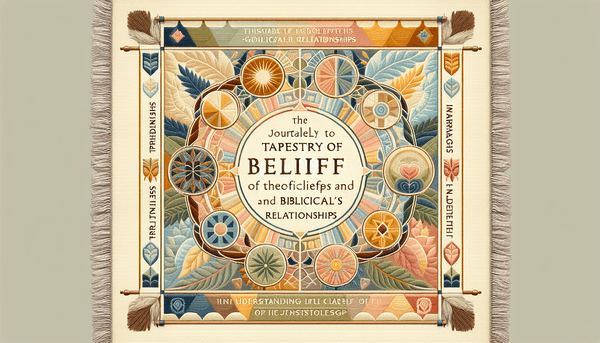How to Be a Good Protestant
To embody the essence of a good Protestant is to forge a personal relationship with the divine, anchored in prayer and scripture. Such a relationship is nurtured through a commitment to understand God's Word and to live by it, echoing the belief that one is justified by faith alone, a truth that resonates in the heart of the Protestant faith (Galatians 2:20). Community plays a pivotal role, as Hebrews 10:25 reminds us not to forsake meeting together, thus emphasizing the importance of fellowship. It is through our interactions with other believers that we become the church, a body of Christ, as diverse in function as it is unified in purpose (1 Corinthians 12:12-27). Embracing these tenets, one steps into the light of Protestantism, marked by an unwavering faith and a life reflective of Christ's love and service.
Biblical Principles for Friendships
Friendship, a vessel for spiritual edification, demands discernment and wisdom. The Bible counsels us to surround ourselves with those who inspire growth and righteousness, for 'Whoever walks with the wise becomes wise' (Proverbs 13:20). True friendship is characterized by mutual love, forgiveness, and encouragement, following the teachings of Christ who exemplified the ultimate friend (John 15:13). As iron sharpens iron (Proverbs 27:17), so should our friendships refine our character and faith. In the companionship of fellow believers, we find support in our trials, joy in our celebrations, and a shared journey towards a deeper understanding of God's word.
Drawing Closer to God
The longing to draw nearer to God is a journey of the soul, marked by consistent engagement with the spiritual disciplines that open the door to His presence. Prayer, an intimate conversation with the Almighty, and meditation on His Word, as encouraged in Psalm 145:18, are foundational practices. The pursuit of God requires a heartfelt seeking, with the promise that those who do so will find Him (Jeremiah 29:13). It is through this search, this hunger for righteousness, that we come to know the transformative power of a personal relationship with Christ. Moreover, the community of believers provides a network of support, a place where faith is shared, nurtured, and strengthened, fulfilling the call to draw close to God together (Hebrews 11:6).
FAQ
Q: What is the difference between Catholic and Protestant beliefs?
A: The main differences include the authority of Scripture, with Protestants adhering to Sola Scriptura, and the Catholic Church valuing tradition and the Magisterium; differing views on salvation and justification; and different church structures, with Protestants emphasizing the priesthood of all believers and Catholics acknowledging papal authority and the veneration of saints and Mary.
Q: How can you be a good Protestant?
A: Being a good Protestant involves cultivating a personal relationship with God through prayer, Bible study, and understanding core doctrines like justification by faith alone. It's also important to be part of a church community and to live out one's faith through service and showing Christ's love to others.
Q: How should you treat your friends according to the Bible?
A: The Bible teaches us to choose our friends wisely, to be kind, forgiving, and sincere, and to build friendships based on mutual love and respect. We should aim to be a source of encouragement and support for our friends, as Proverbs 27:17 suggests, 'Iron sharpens iron, and one man sharpens another.'
Q: What does the Bible say about marriage?
A: The Bible speaks to marriage as a covenant relationship where both spouses are called to love and respect one another. Husbands are to love their wives as Christ loved the church (Ephesians 5:25), and wives are to support their husbands, reflecting mutual submission to one another under God's ordained order.






